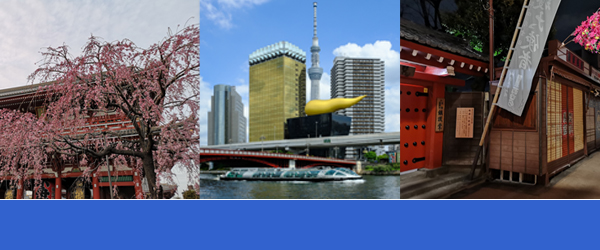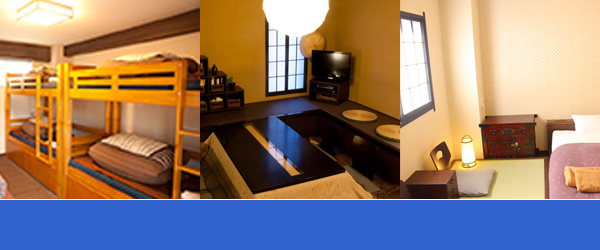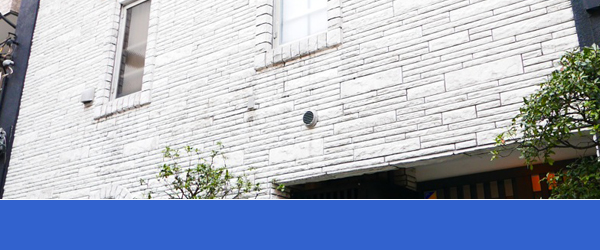Visit Asakusa, a “festival town” where every month is an event!
※This post was published April 2022.
Please note that some events may currently be cancelled or rescheduled due to the pandemic. For more information, please refer to the official page of each event.
Hello! I am staff member Nabe. Are you planning a trip to Asakusa on your next holiday? Asakusa is famous for its sightseeing spots such as the Kaminarimon gate and Senso-ji Temple, but that’s not all.
In fact, here in Asakusa, you can find a fun event taking place nearly every month! After taking in the beautiful sights of Asakusa, why not hang around to enjoy another taste of Japanese culture through these seasonal events?
So here, we would like to introduce to you a schedule of some of the annual events taking place around Asakusa. Now without further ado, let’s dive straight in!
What you will find in this post
●Learn about the annual events and traditions taking place in the Asakusa area.
January
Hatsumode

【Date:December 31~January 3 Location:Senso-ji Temple】
From New Year’s Eve to the third day of the new year, the main hall of Senso-ji Temple is crowded with worshippers for Hatsumode (the first shrine visit of the year) with a total of over 2.8 million visitors within just these three days! This makes it one of the top five most visited Buddhist temples in the metropolitan area.
Senso-ji Temple is sure to be very crowded, but perhaps this is a telltale of its spiritual power and all the prayers that have been answered. There is also a wondrous variety of food stalls on the temple grounds, so you can enjoy some tasty snacks as you pay a visit.
Tondo-yaki

【Date:January 8 Location:Torigoe Shrine】
Dondoyaki, the Japanese tradition of burning New Year’s decorations and good luck charms, can be seen at Torigoe Shrine, just a short walk from Asakusa.
Although festivals involving fire are rare in urban areas due to the risk of fire as well as smoke problems, Torigoe Shrine is the single exception, as it is the only shrine in Tokyo where a large-scale bonfire can be seen (Fun fact: At Torigoe Shrine, the bonfires are called ‘Tondo’ instead of ‘Dondo’).
February
Setsubun Festival

【Date:February 3 Location:Senso-ji Temple】
On Setsubun day (February 2nd), a bean-throwing ceremony is held in the main hall of Senso-ji . Celebrities associated with Asakusa participate in the bean-throwing ceremony and can be seen vigorously scattering the beans from the main hall. In addition, the Seven Gods of Good Fortune will perform the ‘Fukuju no Mai’ dance on a special stage.
Edo Nagashi-bina

【Date: Late February ~ Early March Location: Sumida Park (in Asakusa)】
The Edo Nagashi-bina is an event held in Sumida Park (on the Asakusa side) in which paper dolls, each with prayers of health and well-being of children, are placed into the river. The sight of hundreds of these paper dolls floating down the river is an annual event that heralds the arrival of spring.
March
Dance of the Golden Dragon

【Date: March 18, October 18 Location: Senso-ji Temple】
The Kinryu no Mai (Dance of the Golden Dragon), named after the Senso-ji temple’s trade name Kinryu-san (Mount Gold Dragon), is a vigorous dance performance of a golden dragon puppet. First performed in 1958 to celebrate the completed reconstruction of the main hall, the 5m long and 80 kg dragon has since revealed itself every year to dance powerfully along to the music. The performance takes place in the grounds of Senso-ji Temple and is also performed in October.
Senso-ji Honzonjigene

【Date: March 18 Location: Senso-ji】
Once a year, three shrines in the Asakusa Shrine are carried to the main hall of Senso-ji Temple, where they are enshrined in front of the temple’s principal image. The sight of the shrines, each weighing more than one ton, carried on the shoulders of many people during this ‘Dojo-age’ is truly a spectacle to behold.
Sumida Park Sakura Festival

【Date: Mid March Location: Sumida Park(in Asakusa)】
During the spring season in Sumida Park, there is an illumination event where all the Sakura trees are lit up at night. With approximately 600 cherry trees on the Taito Ward side and 300 on the Sumida Ward side, Sumida park has been selected as a top 100 best place for cherry blossom viewing. The Sumida Ward side, known as the Sumizutsumi Sakura Festival, also has a variety of food stalls set up along the rows of cherry trees.
April
Dance of the White Heron

【Date:2nd Sunday of April, Sanjasai, November 3 Location: Senso-ji Temple】
Dancers dressed as white herons recreate a festival scene from a picture scroll dating back to roughly 300 years, and parade through the Senso-ji temple grounds to the tune of ‘Shirasagi-no-uta’, that is, the Song of the White Heron.
Waseda and Keio Regatta

【Date: Mid-April Location: Between Ryogoku-bashi 〜 Sakura-bashi】
A boat race between Waseda University and Keio University, this water race has a history of more than 100 years. The two schools compete on a 3 km course between Ryogoku Bridge and Sakura Bridge on the Sumida River. Nine rowers from each school compete in the main ‘Rivalry Eight’ race, which stands at a record of 47 wins for Waseda University and 41 for Keio University as of 2021.
Asakusa Horseback Archery

【Date:Mid April Location:Sumida Park (Asakusa)】
A recreation of a New Year’s tradition held at Asakusa Shrine during the Edo period. In this event, archers ride atop their galloping horses through a 200 meter runway whilst shooting arrows at small targets.
Crying Sumo

【Date: Late April Location: Senso-ji Temple grounds】
A unique and, perhaps surprising tradition to some, is the event held to wish for the growth and health of small children, called “Crying Sumo”.
In this event, sumo wrestlers hold a baby in their arms on the ring and tries to make the infant cry; the baby that cries first is the ‘winner’, and is believed to grow to become a healthy young child.
May
Sanja-matsuri

【Date: Mid May Location: In and around Asakusa Shrine grounds】
The festival is synonymous with Asakusa events and is counted as one of the three major festivals of Edo (modern-day Tokyo). The festival celebrates three saints associated with the origins of Senso-ji Temple, who have long been revered as ‘Sanja-sama’. During the festival, mikoshi shrines are paraded through the streets of Asakusa, garnering massive crowds of both participants and onlookers.
Edo Firefighter’s Memorial Festival

【Date:Late May Location:Senso-ji Temple grounds】
This is a memorial service for 120 people who died in the line of duty from the Edo period to Showa period. The memorial service includes a rite of exorcism by a Shinto priest, as well as ladder-riding and traditional kimono-wearing performances.
July
Hozuki Market/Day of 46000 days

【Date:Early July Location:Senso-ji Temple grounds】
The Hozuki (Chinese lantern plant) Market coincides with the festive day on which temple-goers are said to gain 46,000 days’ worth of merit. On the day the market is held, around 100 hozuki stalls fill the temple grounds and many visitors come to seek this special fruit on this special day.
Sumida River Firework Festival

【Date:Early July Location:Near Sakurabashi, Umayabashi of Sumida River】
Fireworks are launched from two venues on the Sumida River at the Asakusa Fireworks Festival, lighting the summer night sky with a multitude of vibrant colors. With approximately 20,000 fireworks, this is the largest firework display in Tokyo.
August
Asakusa Samba Carnival
【Date: Early August Location:Asakusa Umamichi street~Kaminarimon street】
The largest samba carnival in Japan, this exciting festival attracts more than 500,000 people every year.
The performers don their colorful attire and parade from Umamichi street to Kaminarimon street in Asakusa. This annual event also serves as a contest, with each team competing for the best theme and expression.
September
Taito Takigi-Noh
【Date:Early September Location:Senso-ji Temple grounds】
This is a Noh performance (traditional Japanese theater) performed at night under the mystical light of a blazing bonfire. Taito Takigi Noh, which was created more than 40 years ago, emerged from the deep connection between Noh and the Taito Ward, where Asakusa is located. This Noh performance attracts a great number of viewers every year, enchanting all who drop by.
October
Dance of the Golden Dragon
【Date: March 18, October 18 Location: Senso-ji Temple】
The Golden Dragon Dance is also dedicated in October in conjunction with the Chrysanthemum Offering event.
November
Dance of the White Heron
【Date:2nd Sunday of April, Sanja-matsuri, November 3 Location: Senso-ji Temple】
The Dance of the White Heron, dedicated in April and at the Sanja Festival, can also be observed in November.
Tori no Ichi

【Date: November 2~3 times Location: Ootori Shrine】※Dates vary each year
This annual festival is held at Ootori Shrine, a 15-minute walk from Asakusa.
Sold at this festival are lucky rakes for business prosperity, and visitors will find roughly 200 rake stalls fill the precincts of the shrine. This festival begins at midnight, and the numerous rake decorations illuminated by the stall lights create a magical atmosphere.
December
Hagoita Ichi

【Date: December 17~19 Location: Senso-ji Temple grounds】
Dozens of Hagoita (a traditional Japanese game) stalls line the Senso-ji temple grounds. While the 18th of every month is considered to be a day of good fortune for temple-goers, the 18th of December is especially so; as many worshippers came to visit on this day, shops began to sell New Year’s decorations and lucky charms for this occasion. Hagoita with various designs are sold during the fair, but the Hagoita decorated with the trending people of the year are particularly popular.
Joya no Kane (New Year’s Eve Bell)
【Date: December 31 Location: Senso-ji Temple】
On New Year’s Eve, a bell is rung 108 times atop the Bentenzan hill within the temple grounds, heralding the start of a new year.
What did you think? There is almost always something happening throughout the year, here in Asakusa. In addition to the ones listed above, there are so many more events and so much to see, so be sure to check the upcoming events for your next Asakusa trip.
See you in Asakusa!

















